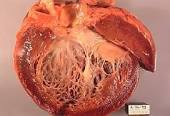
Recently Diagnosed or Relapsed? Stop Looking For a Miracle Cure, and Use Evidence-Based Therapies To Enhance Your Treatment and Prolong Your Remission
Multiple Myeloma an incurable disease, but I have spent the last 25 years in remission using a blend of conventional oncology and evidence-based nutrition, supplementation, and lifestyle therapies from peer-reviewed studies that your oncologist probably hasn't told you about.
Click the orange button to the right to learn more about what you can start doing today.
- You are here:
- Home »
- Blog »
- Multiple Myeloma »
- Multiple Myeloma Symptom, Side Effect, COD- Heart Damage, CICM
Multiple Myeloma Symptom, Side Effect, COD- Heart Damage, CICM

“For patients, the benefits of chemotherapy may be partially obfuscated by deleterious effects on the cardiovascular system (CICM), resulting in a significant increase in morbidity and mortality.”
I was diagnosed with multiple myeloma in early ’94 and underwent induction chemotherapy and an autologous stem cell transplant in 1995. I developed chemotherapy-induced cardiomyopathy (CICM) and chronic atrial fibrillation (Afib) more than 15 years after my induction therapy and autologous stem cell transplant (ASCT). This topic is near and dear to my heart (sorry).
In many ways, the human heart is our most important organ. That may sound like a tall statement but when we’re talking about MM co-morbidities (pre-existing health problems), MM symptoms and side effects, it is no surprise to me that heart failure is a common cause of death for the MM survivor.
The blog post “What is Multiple Myeloma? Oncology has it backwards…“ represents an “AHA” moment for me. When I read a study documenting that MM symptoms, side effects and causes of death all overlapped, I almost fell off my chair.
Oncology has it backwards…I believe that ”the cure is worse than the disease,” as the saying goes…
I think a contributing factor, a problem that contributes to conventional oncology not understanding the long-term damage done by toxic therapies is the fact that different drug companies track side effects differently.
Multiple Myeloma Symptoms Cloud Multiple Myeloma Side Effects-
If you have pre-exhisting heart conditions, or if you develop any of the signs below, please consider either/or conventional therapies or evidence-based non-conventional therapies shown to help our chemotherapy-induced cardiomyopathy.
Signs of chemotherapy-induced cardiomyopathy:
- Mild blood pressure changes.
- Arrhythmias.
- Transient or temporary LV function decline.
- Subtle ECG changes.
- Abnormal cardiac biomarkers (elevated BNP or Troponin I)
Possible conventional therapies shown to damage heart health-
- Bisphosphonates, Zometa, Heart Damage
- Multiple Myeloma Therapy- ASCT, Atrial Fibrillation, Heart Damage, Prevention
- Multiple Myeloma Chemotherapy- Heart Damage Increases Over Time
- Anthracycline- Induced Cardiotoxicity- Late Stage Side Effect
Possible therapies to enhance heart health.
- Myeloma Therapy- Collagen 101- Skin, Bone, Heart Health-
- Multiple Myeloma Therapy- Curcumin for Both Symptoms, Side Effects
- Multiple Myeloma Symptoms, Side Effects- Magnesium
- Multiple Myeloma- Symptoms and Side Effects- Omega-3 Therapy
- Multiple Myeloma Symptoms, Side Effects- Vitamin D3
- Multiple Myeloma- Black Seed Oil, TQ- Kill MM, Pro Bone, Kidney, Heart
- CoQ10 (coenzyme Q 10) ubiquinone for chemo-induced heart damage
- Multiple Myeloma Survival- Dark Chocolate, Heart, Brain, MM
When it comes to my diagnosis of CICM and Afib, after I had a difficult experience with metoprolol, I researched an included a host of evidence-based but non-toxic, non-conventional therapies to protect and even improve my heart health. I still have chronic Afib but my ejection fraction has improved by about 20% since my original diagnosis in late 2010 and my weight, blood pressure, etc. have remained stable.
I’ll never know of course but I believe that I may have prevented my CICM and Afib if I had begun my regimen of heart therapies either at my original diagnosis or in the years immediately following my ASCT.
Let me know if you have any questions about MM, CICM, or Afib.
Hang in there,
David Emerson
- MM Survivor
- MM Cancer Coach
- Director The Galen Foundation
Recommended Reading:
- Kidney, Heart, Bone, etc. Co-Morbidities at Myeloma Diagnosis
- Chemotherapy-induced Cardiomyopathy (CI-CM)- How long have I got?
- Multiple Myeloma Symtom, Side Effects- Exercise-
Chemotherapy-induced cardiomyopathy
“Cardiomyopathy is an adverse outcome of antineoplastic drug therapy that has become increasingly relevant in the management of cancer survivors.
As the efficacy of anticancer treatments has improved, long-term outcomes are altered by the development of cardiotoxicity, which may be associated with an even worse prognosis than that of the underlying malignancy.
From the research into mechanisms, prevention, and treatment, the specialized field of cardio-oncology has evolved, but the recognition and appropriate management of these patients is important for the general internist and general cardiologist as well.
Although antineoplastic chemotherapy can cause multiple forms of cardiotoxicity, including
- arrhythmia,
- pericardial disease,
- valvular dysfunction, and
- myocardial ischemia,
in this review we will focus on chemotherapeutic agents associated with cardiomyopathies, from the anthracyclines to newer, the so-called targeted agents such as tyrosine kinase inhibitors. We also review the diagnostic modalities for chemotherapy-induced cardiomyopathy as well as the prevention and treatment strategies which may prolong the lives of those suffering from cancer.”
Prevention and Treatment of Chemotherapy-Induced Cardiotoxicity
“Recent decades have seen an increase in survival rates for cancer patients, partially explained by earlier diagnoses and new chemotherapeutic agents. However, chemotherapy may be associated with adverse cardiovascular events, including
- hypertension and pulmonary hypertension,
- supraventricular and ventricular arrhythmias,
- cardiomyopathy,
- and other forms of cardiovascular disease.
For patients, the benefits of chemotherapy may be partially obfuscated by deleterious effects on the cardiovascular system, resulting in a significant increase in morbidity and mortality. In this article, we review strategies for prevention and treatment of chemotherapy-related cardiotoxicity…
CONCLUSION- The survival rates of cancer patients have improved substantially with the development of immune checkpoint inhibitors and other therapies with specific molecular targets. However, the potential cardiotoxicity of these treatments requires clinicians to pay special attention to clinical signs and symptoms in order to manage cardiovascular complications.
Preventive, diagnostic, and therapeutic algorithms must be continuously re-evaluated in interdisciplinary cardio-oncology boards, and additional studies are needed to develop more specific strategies for preventing and treating chemotherapy-related cardiotoxicity.”
Introducing a new entity: chemotherapy-induced arrhythmia
“We reviewed published reports on chemotherapy-induced arrhythmias in English using the PubMed/Medline and OVID databases from 1950 onwards as well as lateral references. Arrhythmias were reported as a side effect of many chemotherapeutic drugs. Anthracyclines are associated with atrial fibrillation (AF) at a rate of 2–10%, but rarely with ventricular tachycardia (VT)/fibrillation…
Cisplatin—particularly with intrapericardial use—is associated with a very high rate of AF (12–32%). Melphalan is associated with AF in 7–12% of cases, but it does not appear to cause VT…”


